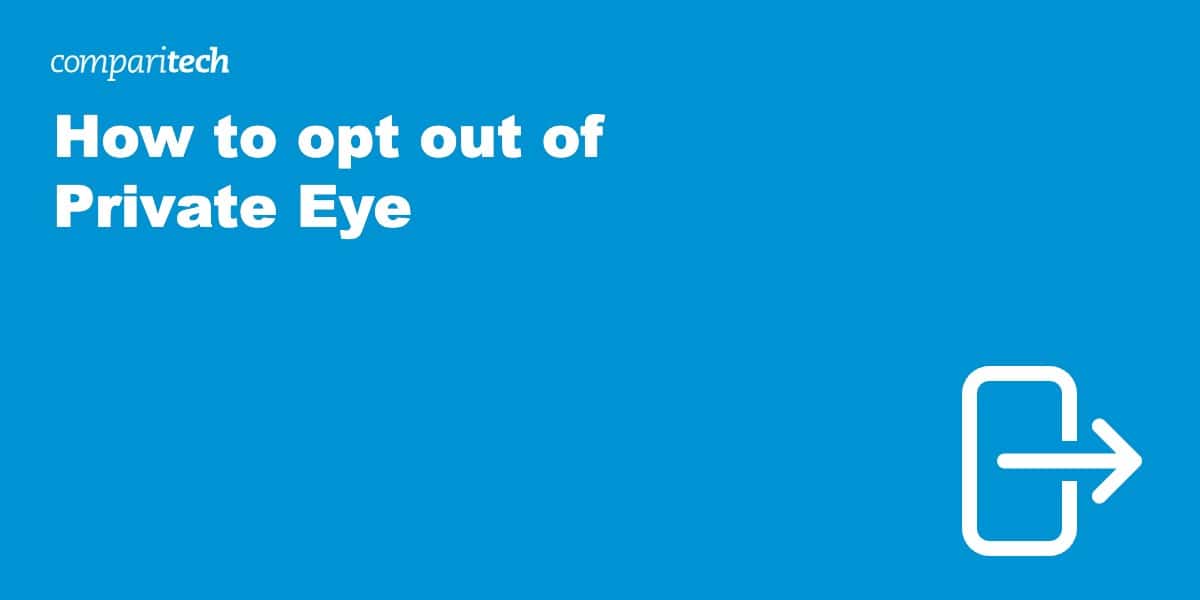Did you know that your full name, home address, and criminal history are a matter of public record? With a little digging, strangers can learn all sorts of information that could be used to steal your identity, harass you, or generally invade your privacy. That’s problematic enough, but sites like Private Eye gather all of your data in one place (without your consent) so that anyone willing to pay a few dollars can find out all about you.
The good news is that you can force Private Eye to delete your profile. This is free and only takes a few minutes, but can drastically improve your privacy by limiting who has access to your details. We’ll walk you through the process shortly, and reveal the best way to remove yourself from people search sites once and for all.
Note: opting out of Private Eye won’t remove your profile from other people search sites. You’ll have to submit takedown requests to platforms like Whitepages and Checkpeople as well. This is pretty time-consuming, though. Luckily, there are tools that can do this for you automatically; here are some of our favorites:
- Incogni: An affordable, hands-off tool from a company with a strong privacy record. Works in multiple countries, automatically escalates complaints, and forces 180+ data brokers to delete your details.
- DeleteMe: Sends takedown requests to hundreds of sites including Private Eye and Nuwber. Very easy to use with 24/7 support and discounts on family plans.
- PrivacyBee: A premium service for those seeking high-level protection. Works with around 350 data brokers and invokes region-specific laws to get your info deleted. Only available in the US for the time being.
The best personal data-removal service: Incogni
Apps Available:
Website: https://www.incogni.com
Incogni is a data-deletion service from Surfshark, a company best-known for its no-logs VPN. One of the reasons we like Incogni so much is that it doesn’t require any input from the user. You just sign up, authorize the organization to act on your behalf, and sit back as Incogni sends requests, chases up unresponsive brokers, and takes care of everything for you.
If you’re curious, you can login and view all ongoing and completed takedown requests, but there’s really nothing to do on your part. Incogni will even contact brokers periodically to make sure they haven’t reacquired your data. Unlike most of its rivals, this service is available in the US, Canada, Europe, and the UK.
Follow these steps to automatically delete your Private Eye profile:
- First, create an Incogni account. One month of coverage costs $12.99 USD, though there’s a 50 percent discount if you sign up for a year
- Enter your personal information and grant Incogni the right to process requests for you
- The service will now begin sending out takedown requests
- Over the next few days, you should start to see completed requests on your dashboard. After a month or so, most of these will be resolved, and another wave will begin
- Incogni’s work isn’t done, but your part is. The service will revisit old requests from time to time, ensuring that once your data is removed, it never comes back. If you have any questions or suggestions for a site you’d like to see supported, just let staff know using the ticket system
BEST DATA-DELETION TOOL:Incogni makes it as easy as possible to remove your personal info from people search sites. It even offers a 30-day money-back guarantee, allowing you to try it risk-free for a month.
How to manually opt out of Private Eye
Private Eye is sneakier than most people search sites. It allows you to hide most of your details from search results but stresses that some of your information will still appear (without letting you know which). Additionally, it has connections to another prominent people search site that it doesn’t make immediately obvious.
Here’s how to manually delete your Private Eye profile:
- Visit Private Eye’s opt-out page
- Enter your full name and location, then hit Opt out
- You should now be able to find your record and request it be deleted. However, conveniently, many users get an error here and are unable to proceed. Don’t worry, though: there is a workaround
- Private Eye is actually owned by Confi-Check, which also operates PeopleFinders, another data-aggregation service. Open up PeopleFinders website, search for yourself, click View, and copy the URL in the address bar
- Scroll down to the very bottom of the page and click Do Not Sell My Personal Information
- Paste the address from before in the top box, enter your email address, solve the Captcha, and click Send Request
- Now, click the link in the verification email. Your profile should be deleted within 48 hours. After this point, it won’t be available on Private Eye either, since both companies share the same database
Worried about what people might have done with your data during the time it was available? You can use an identity theft protection service to keep an eye on your accounts automatically.
Why should I delete my Private Eye profile?
Private Eye actually doesn’t mention what kind of publicly-available data it scrapes, but we know that at a bare minimum, it displays:
- Your full name
- Current and previous addresses
- Email addresses and phone numbers
- The names of your relatives and associates
Additionally, PeopleFinders.com (which Private Eye redirects you to when you try and search for someone) specifically says that it collects all of the above, plus the following:
- Age, marital status, and other protected classification characteristics
- Education and employment history
- Financial records
- Medical and health insurance information
- Details of your online activities (from sites affiliated with PeopleFinders)
Both sites have rules against using this information to determine if you’re eligible for employment, insurance, or tenancy, but there’s really no way to tell if this happens. Of course, having such a wide range of data can also help abusive partners or total strangers track you down, dox you, or send a SWAT team to your home.
Both websites’ terms of service stipulate you agree that they can’t be held liable when such an attack occurs. That’s a whole lot of risk for no benefit, which is why we strongly recommend deleting yourself from people search sites as soon as possible.
Private Eye: Frequently Asked Questions
Will my Private Eye profile come back after I’ve opted out?
If you’re taking steps to delete your Private Eye record, it’d be nice to know that this information won’t become available again in the future. However, the site itself doesn’t address this possibility anywhere. It does mention that even if you unsubscribe from its mailing list, it might keep contacting you, since it may reobtain your email address from somewhere else.
In the interest of caution, we’d recommend looking yourself up on Private Eye regularly and submitting takedown requests whenever you find your details listed. Alternatively, services like Incogni can take care of this for you.
Why does Private Eye have incorrect information about me?
Private Eye (and most similar services) don’t actually verify that their information is correct and don’t have any way to update erroneous records. If you’ve entered a typo on an official form, that mistake will be scraped as-is and displayed on the website. The only way to rectify this is to find the original source of the error and update your details manually.
Still, there’s really no reason to have your information so easily-accessible. That’s why we’d suggest just deleting your Private Eye profile instead.
How can I remove my personal information from the internet?
Deleting yourself from people search sites is a good start but just one step towards the goal of online anonymity. Anyone looking to reduce their digital footprint would do well to read up on cybersecurity fundamentals and really think about how much information they’re giving away on a daily basis.
Luckily, there are plenty of tools designed to limit how much people can learn about your online activities. VPNs, for instance, are a great way to hide your browsing habits from snoopers, while privacy-enhancing browser extensions can help shield you from data-hungry sites like Facebook.



